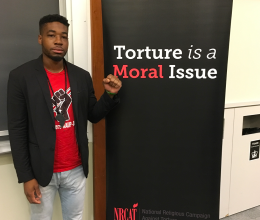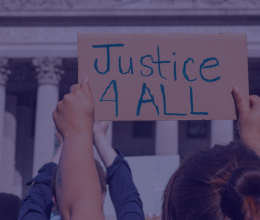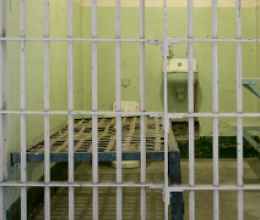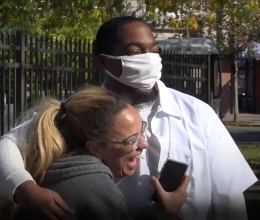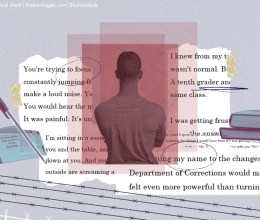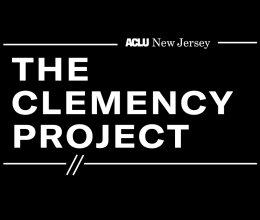
Agreement includes independent monitor for up to five years
NEWARK – A federal judge in Newark today approved a settlement of a class action lawsuit filed in 2008 against Passaic County for unconstitutional and inhumane conditions at the Passaic County Jail. The lawsuit was filed by the American Civil Liberties Union of New Jersey (ACLU-NJ) and Seton Hall University School of Law’s Center for Social Justice (CSJ) on behalf of prisoners at the jail.
The two parties reached a settlement at the end of 2011. Today, U.S. District Judge Dennis Cavanaugh accepted the agreement in court, determining it is fair, reasonable and adequate.
“This settlement marks the start of a new era at the jail,” said CSJ Associate Professor Jenny-Brooke Condon. “For years, detainees, jail employees, lawyers and judges have complained about the overcrowding and unsafe conditions at the jail. We hope that the agreement results in lasting improvements for our clients.”
Judge Cavanaugh commended the attorneys for both the plaintiffs and defendants. Cavanaugh noted that he has heard many complaints about the conditions at the jail over the years and is satisfied that the settlement will address the problems.
“It is significant that the settlement reduces the overall population of the jail,” Cavanaugh said. “Because of that, all other conditions were brought about and magnified and this will resolve that.”
ACLU-NJ Deputy Legal Director Jeanne LoCicero said there is still much more work to be done.
“The presence of an independent monitor demonstrates that both sides are committed to long-term, systemic change,” said LoCicero. “We are anxious to start this new chapter and implement the changes outlined in this settlement, which we believe is a great outcome for the safety and health of detainees, staff members and the community.”
Under the terms of the agreement, the jail will agree to rectify the conditions that led to the lawsuit, including overcrowding, environmental dangers, fire hazards and inadequate medical care. The agreement was reached with input from correctional experts after jail inspections and an exchange of informal discovery.
As part of the agreement:
- A corrections professional will serve as an independent monitor to evaluate the jail’s implementation of remedies and provide technical assistance for up to five years.
- The jail will be prohibited from contracting with other jurisdictions to house inmates.
- The jail must configure beds (including restrictions on the use of triple bunking) to promote inmate health and safety. These changes, accompanied by efforts to keep the average census below 1,022, will insure sufficient space between bunks and toilets and urinals and maximize available floor space.
- The jail will complete the planned upgrades to the jail’s heating, ventilation and air conditioning (HVAC) systems and fire prevention infrastructure, which it began during litigation to comply with the New Jersey Uniform Fire Safety Act, and it will ensure plumbing and electrical systems are in working order.
- The jail will improve the delivery of its medical services and provide timely access to specialty care and chronic disease treatment, in addition to upgrading its medical records systems and obtaining medical accreditation.
- The jail will screen and treat mental illness among inmates more aggressively, including through programs to place inmates on special watch and to prepare mentally ill prisoners for discharge back into the community.
- The jail will overhaul its prison management procedures, adding closed-circuit television surveillance to monitor the safety of inmates and staff, modernizing its prison management systems, and rolling out enhanced training and documentation of staff’s use of force.
- The federal court will retain jurisdiction during the compliance period of the case.
The Passaic County Freeholders approved the agreement in December. The prisoners had an opportunity to consider and comment on the agreement.
In addition to CSJ, a team of attorneys from Dechert LLP, led by Ezra Rosenberg and former partner Chris Michie, serves as the ACLU-NJ’s cooperating attorneys on a pro bono basis.
Since 2007, dozens of law students at Seton Hall Law School’s Center for Social Justice, along with a team of attorneys, have played an important role advocating for the prisoners, including documenting conditions at the jail.
Lawyers who worked on behalf of the class of plaintiffs include: Condon, Patricia Perlmutter, and Rachel Lopez of the Center for Social Justice; Emily Goldberg, formerly of CSJ; Rosenberg, Crotty, and Michael Planell of Dechert; Michie and Jennie Krasner, formerly of Dechert; and LoCicero and Ed Barocas of the ACLU-NJ.
Lawyers and CSJ law students will continue to represent the class of inmates for the duration of the settlement period.
The settlement agreement includes a memorandum of understanding in each of the following areas: correctional management, fire safety, environmental health, medical treatment and mental health care.
Related Content
- Passaic County, CSJ and ACLU-NJ Joint Statement on Settlement (10kb PDF)
- Passaic County Agrees to Overhaul County Jail's Inhumane Conditions
- District Court Opinion (57k PDF)
- Class Certification Brief (1.5mb PDF)
- Complaint (2.2mb PDF)
- Passaic County - Fact Sheet (460k PDF)
